The Sign of Four (Penguin Classics)
 Though I am thoroughly enjoying going through the Sherlock Holmes-stories by Arthur Conan Doyle, this one gets only two stars because I could not set aside my views on racism and colonialism while reading it. The parts about India was so horrifying a read that I wanted to skip them. Englishmen outraged because the Indians rebelled against them - when it was the English who had invaded the country. It's groanworthy to think that such was the situation for much too long.
Though I am thoroughly enjoying going through the Sherlock Holmes-stories by Arthur Conan Doyle, this one gets only two stars because I could not set aside my views on racism and colonialism while reading it. The parts about India was so horrifying a read that I wanted to skip them. Englishmen outraged because the Indians rebelled against them - when it was the English who had invaded the country. It's groanworthy to think that such was the situation for much too long. Otherwise, I still love the characters of Holmes and Watson, they are properly interesting and enjoyable to read. I think A Study in Scarlet was more interesting to read and created more emotion in me, but I'll happily continue reading the rest of the works even if this one wasn't up to par.
Three Lives (Dover Thrift Editions)
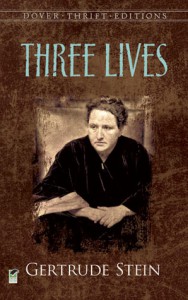 I thought the first story - "The Good Anna" - was quite alright, and I sort of liked the last story - "The Gentle Lena". Had the novel consisted of just these two stories, I probably would have given it three stars. The use of repetition was interesting, and unusual, and even if I've seen the technique used more successfully in other works of fiction, I can appreciate it for what it was at the time of publication. Also, in "The Gentle Lena" (my favourite of the three stories), the repetitions were interspersed with an easy-moving and sad tale, with a plot and characters that managed to hold my interest. Read it in one sitting.
I thought the first story - "The Good Anna" - was quite alright, and I sort of liked the last story - "The Gentle Lena". Had the novel consisted of just these two stories, I probably would have given it three stars. The use of repetition was interesting, and unusual, and even if I've seen the technique used more successfully in other works of fiction, I can appreciate it for what it was at the time of publication. Also, in "The Gentle Lena" (my favourite of the three stories), the repetitions were interspersed with an easy-moving and sad tale, with a plot and characters that managed to hold my interest. Read it in one sitting. However, the reason the book only gets two stars from me, is because of the second story, "Melanctha". It bored me to tears, I'm sorry to say, and is the reason I have spent three months finishing this quite short book. The repetitious language was not interspersed with a very interesting plot, nor was it moving at a pace where I could endure the monotony at long stretches of time. Two-thirds into the story I simply gave up and skipped forward to "The Gentle Lena", and I'm not sorry about it. "Melanctha" could have been sliced down to half its lenght, and might've been quite interesting in that case. As is however, it was much too dull to finish.
Still, I do appreciate the groundbreaking nature of the work, and Stein in many ways must have paved the way for a new approach to literature and writing, which I much admire. That could not have been easy.
Poems: North & South - A Cold Spring
 Rating for A Cold Spring (though North and South got the same rating). I feel like A Cold Spring is slightly better than North and South - though only just. Half a star difference in rating. Brilliant poetry in both collections, but A Cold Spring seems more mature and consise than does North and South.
Rating for A Cold Spring (though North and South got the same rating). I feel like A Cold Spring is slightly better than North and South - though only just. Half a star difference in rating. Brilliant poetry in both collections, but A Cold Spring seems more mature and consise than does North and South.
Auto-da-fe (A Continuum book)
 [DISCLAIMER: The two stars I'm giving this book does not reflect the quality of the work, but my experience of it. I wish there was an additional star or something, for books that you can see are good, but just does not suit your tastes.]
[DISCLAIMER: The two stars I'm giving this book does not reflect the quality of the work, but my experience of it. I wish there was an additional star or something, for books that you can see are good, but just does not suit your tastes.]I could not finish it. I've been trudging through it since August, it is now December, and I've only gotten halfway. The first hundred pages I liked, and read quickly. After that however, it just got harder and harder to summon up the will to read. Every time I picked it up I read a few pages, found myself bored and uninterested, and put it down again to go read something else.
It's a shame, because I can see that it is at times well written, and there are several really good parts, but I can't help it: I find it inexplicably dull. The prose is extremely dense, yet little happens at all, and the characters are just... boring. I suppose they are meant to be, you aren't really supposed to feel sympathy for any of them, so that worked, I guess. It just made the novel even more unreadable for my part.
Canetti drags out details and minute scenes into several pages - sometimes chapters! - and while this can be done very successfully (see Nicholson Baker), Canetti does not manage to hold my interest while doing it. He also spends a lot of time in the head of his characters, both detailing dreams (which I hate in a novel, it seems like a silly trick most of the time) and thoughts. In a few parts this is well done - Canetti manages to show the lunacy of his characters in an original manner, where I was delighted by the flow of the prose. Most of the time however, I'm just bored. Bored, bored, bored.
I have, even though I hate doing it, decided to leave it unfinished, because I can't keep up reading a book that bores me to tears (especially such a long book, with such tiny typeface!). It's a waste of time, time I could spend reading other, more interesing books. I might come back to it one day, so I've marked my place, but for now, it'll stay half-unread.
Flora Segunda: Being the Magickal Mishaps of a Girl of Spirit, Her Glass-Gazing Sidekick, Two Ominous Butlers (One Blue), a House with Eleven Thousand Rooms, and a Red Dog
 [DISCLAIMER: As with the Canetti-book, the rating reflects my reading experience, not the quality of the work.]
[DISCLAIMER: As with the Canetti-book, the rating reflects my reading experience, not the quality of the work.]Since the new year is approaching fast, I have decided to become much stricter with my reading habits. It used to be that I had to finish books no matter how dull or hard I might find reading them - NO MORE. Thus I am putting away several of the books that have just been languishing for months, where I only manage to read a few pages at a time before getting bored.
Flora Segunda was, I am sorry to say, one of these books. I started it in October, wildly excited about it, because from the title I was sort of hoping for a Harry Potter-esque reading experience. I was disappointed.
Flora Segunda is ... a strange book. I have no other words for it. Its world building, characters and happenings are very strange, and while I tend to like that - truly original genre work is sort of hard to find - it fell flat in this case.
I had a much too difficult time trying to keep track of all the characters, places, names and customs to actually enjoy the reading. I never managed to get immersed in the world, which is a bad sign in a fantasy book for me. I want to be whisked away to strange lands, not be painfully aware that I am reading about constructed strange lands!
The plot also seemed very scattered. When I felt like the book was going in one direction, it suddenly weered off in another. Maybe I didn't hold out long enough for the proper plot to gather up steam and get going, but I really didn't feel like finishing the book. It was sitting on my Kindle taunting me.
But; the characters are (for the most part) strong, original and interesting. The world is very different and original. It's just that the execution of the whole thing was confusing and mangled, and I didn't enjoy it.
Maybe I'll finish it some other time, or pick up another book by Wilce in the future (because I feel like she has all the right ideas about how fantasy should and could be written), but for now, I'll put it away.
Blue Angel: A Novel (P.S.)
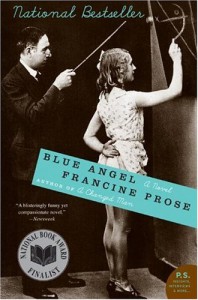 This was a quick and easy read, and for the first half of the book, I really quite liked it. I thought the language was very good, most of the characters interesting, and the story was engaging.
This was a quick and easy read, and for the first half of the book, I really quite liked it. I thought the language was very good, most of the characters interesting, and the story was engaging. But something happened along the line, where it just turned sour for me. It was as if the novel tried to do what Lolita does so efficiently - making us sympathize with a character who does not deserve it - and fails.
I have no problems with books where I don't like the main character. That's not an issue if the book is well written and the story interesting. Here, it is well written, but the story just turned incredibly dull during the second half. I knew what was coming every inch of the way, and I was frustrated over the fact that the main character was so oblivious to it.
I tried very hard to like the novel, because the language endeared me to it, and because I loved the author's book on reading and writing ([b:Reading Like a Writer: A Guide for People Who Love Books and for Those Who Want to Write Them|39934|Reading Like a Writer A Guide for People Who Love Books and for Those Who Want to Write Them|Francine Prose|http://d.gr-assets.com/books/1335367374s/39934.jpg|1435619]). Sadly, there were several things nagged me into dropping it from three to two stars. Spoilers ahead.
First: The married main character has sex with a student (as in, they get naked, and intercourse starts), but doesn't finish because he breaks a tooth. The rest of the book he calls himself a "semi-adulterer", and that he "tried" to have sex with her. No. You had sex. Finishing has nothing to do with it.
Second: The book makes working to stop sexual harassment, and working in women's shelters sound like BAD things, like political correctness gone crazy. I know that this is how the character thinks, but still, it annoyed me endlessly. It ends with the student he had sex with lying about how they came about having sex - which smacks of slut-shaming to me. Girls have a hard enough time being believed when they have been sexually assulted, and in my opinion, there does not need to be novels adding to that idiocy. I feel like the novel handled the theme poorly and unoriginally - it could have been handled in tens of different better ways, all more interesting and original.
Third: It was, in the beginning, funny to read how exasperating a writing workshop can be. But then it just goes on and on about how awful it is to have your work read and critized by peers, and I don't think that's all there is to it at all. Sure, workshops can be damaging. They can also be very helpful. It goes both ways. The novel never lights on this fact.
Fourth: Too much sex. I'm sorry, but even if the novel is about a silly infatuation, an adulterer, a teacher-student relationship; there was too much sex. Every woman was described in terms of beauty, every man was described as wanting to or having had sex with every woman they could get their hands on. It could've been done with much more grace, beauty, and delicacy. It could've been done with fewer clichés, and more poetry. Again, the novel seems to try to take a leaf out of Lolita, and fails. It's not even properly provocative, it's just annoying.
I was hoping for a novel about writing and writing workshops, an interesting take on a theme I haven't read a lot about - talent and creativity and how it can be worked with and molded - and it just dumped that part of it after the first half, and turned into a tirade of lust, sex, lies and alcohol. Disappointing.
The Great Gatsby (Penguin Popular Classics)
 The first time I read this book, in high school, I hated it with a passion. I thought it was unbelievably dull. But now I've gotten a greater appreciation of both Fitzgerald himself, and the time this type of literature was written in. So, ten years later, I decided to read it again.
The first time I read this book, in high school, I hated it with a passion. I thought it was unbelievably dull. But now I've gotten a greater appreciation of both Fitzgerald himself, and the time this type of literature was written in. So, ten years later, I decided to read it again. And I loved it. It was a beautiful read, from beginning to end. Fitzgerald has an amazing power of description, it's delicious to read. His metaphors and similies are brilliant. There are a lot of them, but it didn't feel eiter contrived or overly much, it felt just right. It peppered the novel with poetry.
So from one star to four. I think I have to reread more books I didn't like when I was 17-18...
 1
1
 A very interesting, and in many ways disturbing book. At times very grotesque and nauseating, which worked well in the story, and at the same time weren't too overwhelming. I think the issues were explored well, and the satire successfully conveyed.
A very interesting, and in many ways disturbing book. At times very grotesque and nauseating, which worked well in the story, and at the same time weren't too overwhelming. I think the issues were explored well, and the satire successfully conveyed. However, like a lot of satires, I also at times felt like I were being hit over the head with the message. I am very aware of the problematic aspects of our culture, and the possibility of the culture described in Feed, it's something I think about quite often. So that might've added to the fact that I felt a bit like Anderson was feeding me his point. It didn't need to be spelled out quite so detailed, I felt.
There is of course the fact that satires are meant to do exactly what Anderson did - they mean to convey a specific point. And Anderson did that indeed, so I'd rate it a success in that regard. Still I felt the actual story (plot) and the characters suffered a bit from being more like props than actual characters with problems and dreams and ambitions, in Anderson's quest to get his message out there. Satires and such can be gripping and thought provoking at the same time. Books like 1984 and Brave New World does what Anderson tried to do, in a more effective, and gripping way. They make the readers sympathetic to both the message AND the characters and their plight. As it was I developed only slight sympathies for any of the characters in Feed, and what plot there was didn't prod me to read like a lot of other books do.
Still - not a bad book. This review seems very negative upon reread, but I liked the novel, overall.
The Casual Vacancy
 I had long awaited Rowling's latest book, and was prepared for the fact that it was both an adult novel and strictly non-fantasy. That didn't faze me in the least. I was looking forward to it very much none the less.
I had long awaited Rowling's latest book, and was prepared for the fact that it was both an adult novel and strictly non-fantasy. That didn't faze me in the least. I was looking forward to it very much none the less. But I was not prepared to not like it. Because I don't. I really, really don't like it.
I didn't even manage to finish it, having to stop approximately 300 out of the 500-something pages in. Even though I didn't finish it, this review will contain spoilers. There will be no specific plot points revealed, but I talk at length about what the book includes in its narrative, so read on at own risk.
I very rarly do not finish books. Books I never finish sticks in my mind, and I hate it. This, in other words, speaks loudly of how much I disliked the book.
And it is not necessarily because it is bad. Rowling knows how to write - she writes very well. I did have trouble following who was who, but that's because the character gallery is HUGE, with equal time focussed on every main character. Some of the characters were also bland enough that I had trouble keeping them apart from each other. It was easier after a while, though, so not too much of a criticism.
The book is also very detailed, have lots of really good descriptions, and is for the most part a very believable protrait of certain human characteristics.
However, Rowling has chosen to write solely about the depressing facets of human experience. Depravation; anger; violence; sadness; corruption; abuse both physical, mental and sexual; marital strife; childhood traumas etc etc.
The list of depressing shit goes ON AND ON. It doesn't let up in the least. I was on the verge of stopping after the first tiny description of incest, but read on, hoping it would also be the last. But then a second scene was leading up to rape, and even if I skipped ahead (from what I could see it lasted quite a few pages, which means it must have been very detailed) I just couldn't go on reading. I do not handle depiction of sexual abuse very well, and since the life of the inhabitants of the village of Pagford is so endlessly horrid and depressing on top of it, I just couldn't finish. I knew there would be no ray of sunshine at the end, there would be no redeeming factors, there would be no happy turning points.
I read a few reviews that mention how the book ends before I properly decided to not finish it, and they simply cemented what I already suspected. Shit stays shit in the book.
Every single couple fights and argues and detests each other in this book. Almost every character is either pathetic, revolting, spiteful or a combination of all three. Everyone is more or less depressed in their own special or unspecial way. There is way too much cursing and focus on (not very nice) sexual matters. Stupidity and lack of courage abounds in a world so horridly dystopian that it made me literally nauseous.
The book makes out to be very realistic. Maybe it is. Maybe small towns around the world really are like the Pagford in the book. If that's the case, I will never ever move to one. But I can't shake the feeling that NO town is THIS depressing and depraved. It seems Rowling is trying to make a point about how everyone, no matter how they seem on the surface, is depraved deep down - I don't buy it. Not to this extent. I know lots of happy couples (I'm in one myself for goodness sakes!), I know lots of people who aren't depressed, I know people who has never known any sort of abuse, neither from their schoolmates nor anyone else.
If the book had included a couple of happy characters inbetween all the gloom I might have read on. If the book had included the promise of a better future for its most sad and pitiful characters, I might have read on. It did not. So I will not finish it.
I am disappointed, in a way. But Rowling is a good author, and while the HP-series fit my reading preferences perfectly, this did not. That's just too bad for me, she is after all free to write whatever she wants to write. Lots of people will love this book, I'm sure of it.
And I am still looking forward to seeing what she'll write in the future.
The Handbook of Creative Writing
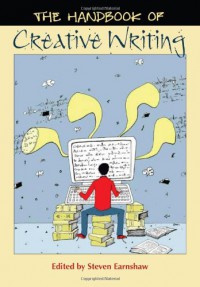 A good and thorough handbook, certainly, and one I come back to as a resource and a guide again and again. The parts I have use for are brilliant. The reason it only gets three stars is largely because so much of the book is of little interest or use to me. I never intend to write for radio or television, thus those chapters were simply skipped. But, as said; a quality book none the less.
A good and thorough handbook, certainly, and one I come back to as a resource and a guide again and again. The parts I have use for are brilliant. The reason it only gets three stars is largely because so much of the book is of little interest or use to me. I never intend to write for radio or television, thus those chapters were simply skipped. But, as said; a quality book none the less.
Wide Awake
 A huge disappointment after Boy Meets Boy. This novel was way too preachy, I felt like Levithan hammered me over the head with his message at every point. Where Boy Meets Boy was beautiful, funny and sad, Wide Awake was just... boring. I felt no sort of relationship with the characters at all, there was never any doubt as to how it all would turn out, and the beautiful phrases that had made Boy Meets Boy such a joy to read was sorely lacking from this novel.
A huge disappointment after Boy Meets Boy. This novel was way too preachy, I felt like Levithan hammered me over the head with his message at every point. Where Boy Meets Boy was beautiful, funny and sad, Wide Awake was just... boring. I felt no sort of relationship with the characters at all, there was never any doubt as to how it all would turn out, and the beautiful phrases that had made Boy Meets Boy such a joy to read was sorely lacking from this novel.
Boy Meets Boy
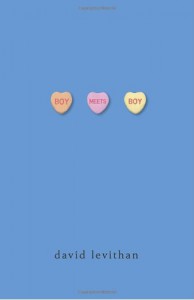 An absolutely fantastic book. It was the most beautiful love story I have read in quite some time. I absolutely couldn't put it down, devouring it in a matter of hours. The writing was so poetic and fluent, and the story was both funny and intriguing and sad, in beautiful ways. A book that goes slam into my list of favourites, without a doubt.
An absolutely fantastic book. It was the most beautiful love story I have read in quite some time. I absolutely couldn't put it down, devouring it in a matter of hours. The writing was so poetic and fluent, and the story was both funny and intriguing and sad, in beautiful ways. A book that goes slam into my list of favourites, without a doubt. ETA, after reading some of the one star reviews...:
It is an idealised world, yes; fairy tale-like, sure, but still - so beautiful. Science fiction and fantasy appeal to me for that reason: They are realities I would like to have exist. Here, I think that a world where sexualities doesn't matter and it's all about the people, SHOULD exist, and COULD exist, if people would just stop and think properly about it. Who one loves should not be an issue other people get caught up in and get angry about. That's what Levithan is trying to show, I think. That's how the world should be like. Sadly, it isn't, but maybe there's a future like that.
Quiet: The Power Of Introverts In A World That Can't Stop Talking
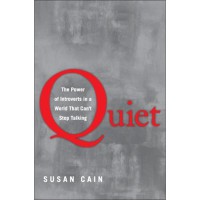 Loved it. Absolutely loved it. Just about every page had me going "This is me, this is me!" There were so many perfect descriptions of thoughts, actions, feelings and situations I've been in, to the point of being uncanny. I also loved that fact that she's not blatantly saying ALL introverts are like this, or ALL extraverts are like this, but that there's a baseline that we tend to have in common - and that it's ok to differ from this baseline. The book is also surprisingly funny, in addition to being very enlightening and scientific. She mixes case studies, facts and statistics nicely with touching personal stories, interviews and funny observations and comments.
Loved it. Absolutely loved it. Just about every page had me going "This is me, this is me!" There were so many perfect descriptions of thoughts, actions, feelings and situations I've been in, to the point of being uncanny. I also loved that fact that she's not blatantly saying ALL introverts are like this, or ALL extraverts are like this, but that there's a baseline that we tend to have in common - and that it's ok to differ from this baseline. The book is also surprisingly funny, in addition to being very enlightening and scientific. She mixes case studies, facts and statistics nicely with touching personal stories, interviews and funny observations and comments. It's a book that made me realise several things about myself - why I've always been bad at group work and brain storming, for example, or why I almost always prefer communicating through writing. I also realised there are other people too that feel the need for solitary "down time" after lots of socialising - I'm not just a weirdo. It was so interesting reading all those interviews with people who could basically have been me.
It made me feel pleased with being the introvert I am, and it also gave me tips and strategies for dealing with situations when I need to go outside my introverted comfort zone. It gave me insights into some of the things I've found inexplicable in myself, and gave me words to describe those things. I'm a "high sensitive". Now that I know that, I can deal with it, and I can prepare better for situations which will make me feel uncomfortable because of this fact.
It made me realise that there isn't something wrong with me for liking solitude, for being bad at small talk, for being (painfully) empathic.
It has made be realise it's ok to be introverted - as the cliché saying goes: It takes all kinds to make a world.
Please Look After Mother
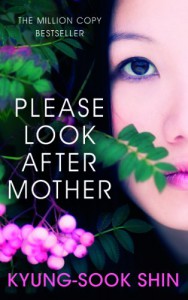 Heartbreakingly amazing. I had no idea what I was in for when I started reading, but when I started I simply couldn't stop, and read the whole book through in a few hours. The detail with the shifting narrators and point of views were very effective, and emotive. At the start of every new narrator there was a slight moment of difficulty in understanding who was talking, but it made it more enjoyable, for me.
Heartbreakingly amazing. I had no idea what I was in for when I started reading, but when I started I simply couldn't stop, and read the whole book through in a few hours. The detail with the shifting narrators and point of views were very effective, and emotive. At the start of every new narrator there was a slight moment of difficulty in understanding who was talking, but it made it more enjoyable, for me. And every little detail in this novel is so well written, so well thought out. I could see all their lives, their personalities, the places described so vividly, it was like being there. There were very few pages that didn't make me tear up.
I desperately hope more of her work is translated, because I would buy it all in an instant.
The Last Man (Oxford World's Classics)
 I spent a whopping six months finishing this (though there was approximately two or three months where it wasn't read at all, because of school), which is a horrendous slow reading pace for me.
I spent a whopping six months finishing this (though there was approximately two or three months where it wasn't read at all, because of school), which is a horrendous slow reading pace for me. I went into the book expecting something akin to Frankenstein. In that regard, I was sadly disappointed. It's not a bad book, as my three stars clearly states: I did like it. But it is long winded. The writing is beautiful, but the action is slow and at times rambling. The plot moves in strange ways. I did not like the way random characters are introduced into the story only to be never heard of again. I understand this is supposed to give flavour and zest to the story, but for my part, it didn't work. The novel would have benefited greatly if it had been shortened considerably.
That being said - I loved the last volume. And in my opinion, the very last two-three chapters are the best of the entire novel. They are very moving, very lifelike and full of emotion. The main problem I had with the start of the novel has to do with the fact that I couldn't really picture anything - there was so much abstract philosophy tossed in at every single point. Not so with the ending. It is strong and evocative and very vibrantly written. I would give the ending five stars without a doubt.
Also, the book made me want to read Frankenstein again. And it certainly hasn't deterred me from wanting to read more of Shelley's. Which is a good thing.
The Night Circus
 Marvellous book, absolutely marvellous. I don't have enough words to describe how much I loved it. Morgenstern is a new Diana Wynne Jones, a new Neil Gaiman. When I finished the novel, I simply wanted to begin reading it once more.
Marvellous book, absolutely marvellous. I don't have enough words to describe how much I loved it. Morgenstern is a new Diana Wynne Jones, a new Neil Gaiman. When I finished the novel, I simply wanted to begin reading it once more.


